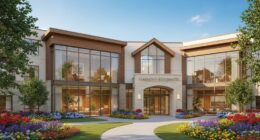As the senior living industry contends with unprecedented growth, data analytics and artificial intelligence (AI) have emerged as transformative technologies reshaping operational paradigms across the sector. With over 800,000 older adults currently residing in U.S. senior communities and demographic projections indicating substantial demand escalation in the coming decade, providers must leverage computational solutions to address concurrent workforce shortages while elevating service delivery standards through technologically enhanced processes. Sensor-based systems that monitor residents’ mobility patterns and vital signs are becoming increasingly common for fall prevention initiatives.
You’ll find that advanced analytics platforms are reconfiguring resource allocation protocols within facilities, enabling predictive staffing models calibrated to anticipated resident call volumes and optimizing scheduling efficiencies across departments. These systems simultaneously reduce operational expenditures through algorithmic assessment of resource utilization patterns, allowing administrators to implement data-driven cost containment strategies while maintaining service quality metrics above industry benchmarks. Leading providers like LCS are investing in analytics as a long-term strategy to remain competitive in the evolving senior housing landscape.
The integration of AI applications extends beyond operational domains into resident care modalities, where medication management protocols benefit from enhanced precision through automated monitoring systems. Real-time physiological data collection enables proactive intervention strategies when essential sign parameters deviate from established thresholds, while personalized care plan development incorporates thorough health and wellness metrics to customize service delivery according to individual resident requirements.
Implementation challenges persist, however, as organizations navigate vendor selection complexities and address data consolidation requirements across disparate systems. Staff training initiatives represent a critical success factor in technology integration strategies, necessitating structured educational programs focused on analytical tool utilization and interpretation methodologies.
The future analytical landscape incorporates emerging technologies including augmented and virtual reality applications designed to enhance resident engagement modalities. Reputation management analytics and sentiment analysis tools provide quantifiable metrics regarding community perception and staff satisfaction levels, while predictive insight capabilities are evolving from retrospective analysis frameworks toward anticipatory models capable of forecasting operational requirements with increasing precision.
Through these technological adaptations, senior living communities are establishing new operational paradigms characterized by data-informed decision processes and AI-augmented service delivery systems.





